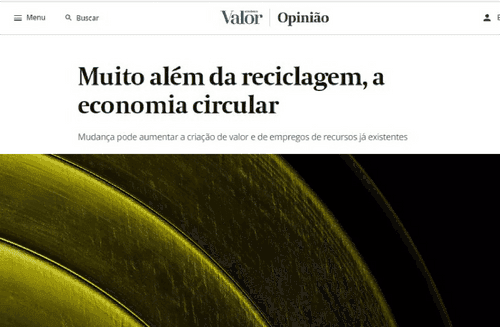
03/11/2021
Valor Econômico: the circular economy
This is awesome! The Valor Econômico newspaper published a super cool article about the circular economy and the opportunities created by this new work model. Check it out:
Far beyond recycling, the circular economy
Change can increase the creation of value and jobs from existing resources
By Teresa Rossi and Sergio Leitão
The alarming signs of climate changes and the depletion of natural resources, with effects on food production, the generation of energy and the very conditions of life on Earth, call attention to a challenge: it is necessary to abandon, and soon, the world of planned obsolescence and disposable products. The term “circular economy” already inspires new business models and promises to become commonplace in the value chains that will be established in the coming decades. It brings, like any great innovation, tremendous challenges. And great financial and commercial opportunities.
The term “circular”, in this case, is opposed to the current idea of a “linear economy”, based on production, consumption and disposal. More than a few modern and necessary practices, such as reuse, process optimization, recycling or remanufacturing, the circular economy brings a new way of producing and consuming products and services, for reduction or direct elimination of waste, pollution and gas emissions of greenhouse gases that accelerate climate changes.
In addition to the effort to integrate the different players in the production chain, the new business vision incorporated into the circular economy also replaces a paradigm: instead of ownership of a product, in many cases, shared use is adopted, in the form of a service, as it already exists in urban transport, for example, with the rental of bicycles and electric cars.
From the packaging sector to textiles and civil construction, there are many opportunities in Brazil to adopt this new way of organizing production and consumption.
This change, in addition to making economic sense, can be a stimulus for greater competitiveness in companies. With the redesign of products and manufacturing processes accompanied by new forms of maintenance, reuse, and use, it is possible to make use of existing resources and increase their capacity to generate value - and even jobs.
The principles of this new way of thinking about the economy include three pillars: eliminate pollution and other residues; expand the lifecycle of products and materials; and regenerate ecosystems. It is imperative to avoid value destruction, reintegrating natural resources and used inputs into production chains and creating markets for these secondary raw materials. There are already numerous studies showing the potential to increase profitability and reduce risks for companies and financiers that opt for the circular economy. Three years before the approval of a pioneering law on the subject in the European Union, one of the most profound of these studies found the gigantic waste that accompanies the generation of wealth in the developed world: Europe, in 2015 - threw it in the trash or in the incinerator, after a limited period of use - 95% of the material value and energy cost required for products consumed by its citizens, and recovered only 5% with recycling and use of waste in energy production.
Prepared by the Ellen-McArthur Foundation and the McKinsey Center for Business and Environmental Economics, the study showed that the circular economy would increase European productivity by 3% annually, with the equivalent of €600 billion in resource savings and parallel earnings equivalent to €1.2 trillion. The European GDP, with this, would have an additional growth of seven percentage points, in 15 years.
The numbers offer the dimension of the business opportunities, innovation and technological increment involved in this transformation, which is already of interest to the market. European funds dedicated wholly or partially to assets with a focus on the circular economy have seen their investment portfolios go from US$300 million to US$1.2 trillion since 2020. Experts from the Research Development Foundation linked to the Federal University of Minas Gerais (Fundep-UFMG) recall that China, another pioneer in initiatives in this field, is now able, with a circular economy plan, to recover 20% of its mining waste and turn it into a competitive product in international markets.
In Brazil, one of the areas with great potential is the textile sector, with the development of fabrics and garments with a longer life cycle and reuse. We should be more advanced in this field. In addition to promoting new technologies and saving resources, protecting the productive sector from cycles of high raw material prices, the application of the circular economy is beginning to be recognized for its potential to reduce investment risks.
A recent study by the traditional Bocconi University in Milan, with European companies in 14 industries, showed that the greater the company's adherence to the principles of the circular economy, the lower the risk of default and the greater the risk-return ratio in its shares. These companies, by modernizing processes and products, reduced risks by making growth decoupled from the consumption of resources (the so-called decoupling); use more diverse business models; and anticipate stricter regulations or changes in consumer preferences.
Europe, where the debate is advanced, has already adopted regulations and incentives to promote the more efficient use of natural resources. In Brazil, as in all Latin America, the challenges of this transition are greater because a considerable part of the extraction of natural resources exported to more developed countries is concentrated here. In other words, we not only need to promote the more efficient use of natural resources, but also find ways to extract them that allow the regeneration of ecosystems.
While we are taking steps in this debate, Chile commands the circular economy agenda in the region, as it seeks, for its mining industry, new technologies for extracting and reusing waste. Brazil needs to prioritize the issue on the government's and potential investors' agenda. The benefits are evident and the challenges facing the Brazilian economy are clear, which go far beyond our already considerable cyclical problems and demand urgent action.
Teresa Rossi and Sergio Leitão are, respectively, Project Coordinator and Executive Director of Instituto Escolhas

